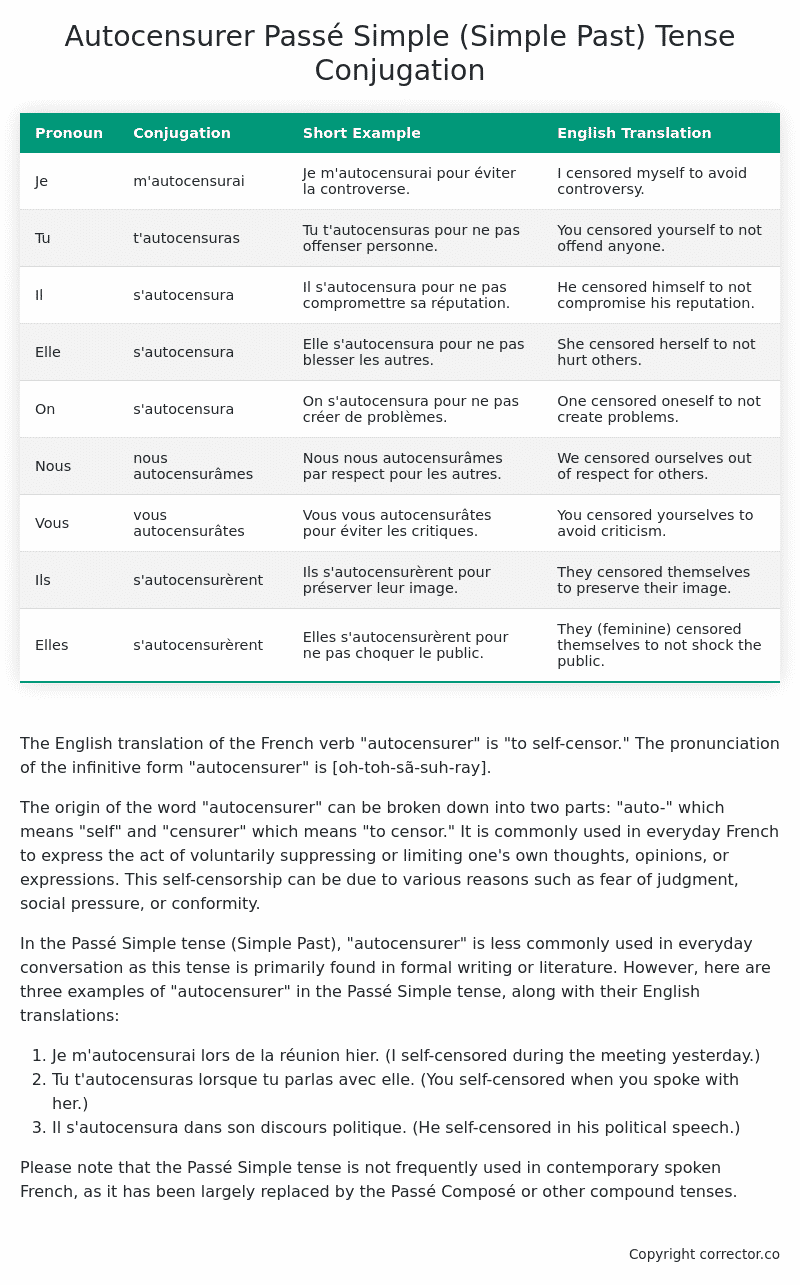Passé Simple (Simple Past) Tense Conjugation of the French Verb autocensurer
Introduction to the verb autocensurer
The English translation of the French verb “autocensurer” is “to self-censor.” The pronunciation of the infinitive form “autocensurer” is [oh-toh-sã-suh-ray].
The origin of the word “autocensurer” can be broken down into two parts: “auto-” which means “self” and “censurer” which means “to censor.” It is commonly used in everyday French to express the act of voluntarily suppressing or limiting one’s own thoughts, opinions, or expressions. This self-censorship can be due to various reasons such as fear of judgment, social pressure, or conformity.
In the Passé Simple tense (Simple Past), “autocensurer” is less commonly used in everyday conversation as this tense is primarily found in formal writing or literature. However, here are three examples of “autocensurer” in the Passé Simple tense, along with their English translations:
- Je m’autocensurai lors de la réunion hier. (I self-censored during the meeting yesterday.)
- Tu t’autocensuras lorsque tu parlas avec elle. (You self-censored when you spoke with her.)
- Il s’autocensura dans son discours politique. (He self-censored in his political speech.)
Please note that the Passé Simple tense is not frequently used in contemporary spoken French, as it has been largely replaced by the Passé Composé or other compound tenses.
Table of the Passé Simple (Simple Past) Tense Conjugation of autocensurer
| Pronoun | Conjugation | Short Example | English Translation |
|---|---|---|---|
| Je | m’autocensurai | Je m’autocensurai pour éviter la controverse. | I censored myself to avoid controversy. |
| Tu | t’autocensuras | Tu t’autocensuras pour ne pas offenser personne. | You censored yourself to not offend anyone. |
| Il | s’autocensura | Il s’autocensura pour ne pas compromettre sa réputation. | He censored himself to not compromise his reputation. |
| Elle | s’autocensura | Elle s’autocensura pour ne pas blesser les autres. | She censored herself to not hurt others. |
| On | s’autocensura | On s’autocensura pour ne pas créer de problèmes. | One censored oneself to not create problems. |
| Nous | nous autocensurâmes | Nous nous autocensurâmes par respect pour les autres. | We censored ourselves out of respect for others. |
| Vous | vous autocensurâtes | Vous vous autocensurâtes pour éviter les critiques. | You censored yourselves to avoid criticism. |
| Ils | s’autocensurèrent | Ils s’autocensurèrent pour préserver leur image. | They censored themselves to preserve their image. |
| Elles | s’autocensurèrent | Elles s’autocensurèrent pour ne pas choquer le public. | They (feminine) censored themselves to not shock the public. |
Other Conjugations for Autocensurer.
Le Present (Present Tense) Conjugation of the French Verb autocensurer
Imparfait (Imperfect) Tense Conjugation of the French Verb autocensurer
Passé Simple (Simple Past) Tense Conjugation of the French Verb autocensurer (You’re reading it right now!)
Passé Composé (Present Perfect) Tense Conjugation of the French Verb autocensurer
Futur Simple (Simple Future) Tense Conjugation of the French Verb autocensurer
Futur Proche (Near Future) Tense Conjugation of the French Verb autocensurer
Plus-que-parfait (Pluperfect) Tense Conjugation of the French Verb autocensurer
Passé Antérieur (Past Anterior) Tense Conjugation of the French Verb autocensurer
Futur Antérieur (Future Anterior) Tense Conjugation of the French Verb autocensurer
Subjonctif Présent (Subjunctive Present) Tense Conjugation of the French Verb autocensurer
Subjonctif Passé (Subjunctive Past) Tense Conjugation of the French Verb autocensurer
Subjonctif Imparfait (Subjunctive Imperfect) Tense Conjugation of the French Verb autocensurer
Conditionnel Présent (Conditional Present) Tense Conjugation of the French Verb autocensurer
Conditionnel Passé (Conditional Past) Tense Conjugation of the French Verb autocensurer
Conditionnel Passé II (Conditional Past II) Tense Conjugation of the French Verb autocensurer
L’impératif Présent (Imperative Present) Tense Conjugation of the French Verb autocensurer
L’impératif Passé (Imperative Past) Tense Conjugation of the French Verb autocensurer
L’infinitif Présent (Infinitive Present) Tense Conjugation of the French Verb autocensurer
L’infinitif Passé (Infinitive Past) Tense Conjugation of the French Verb autocensurer
Le Participe Présent (Present Participle) Tense Conjugation of the French Verb autocensurer
Le Participe Passé (Past Participle) Tense Conjugation of the French Verb autocensurer
Struggling with French verbs or the language in general? Why not use our free French Grammar Checker – no registration required!
Get a FREE Download Study Sheet of this Conjugation 🔥
Simply right click the image below, click “save image” and get your free reference for the autocensurer Passé Simple tense conjugation!

Autocensurer – About the French Passé Simple (Simple Past) Tense
Formation
Usage
Narration
Historical Context
Interactions with other tenses
Passé Composé
Imparfait
Conditional and Subjunctive
Summary
I hope you enjoyed this article on the verb autocensurer. Still in a learning mood? Check out another TOTALLY random French verb conjugation!


